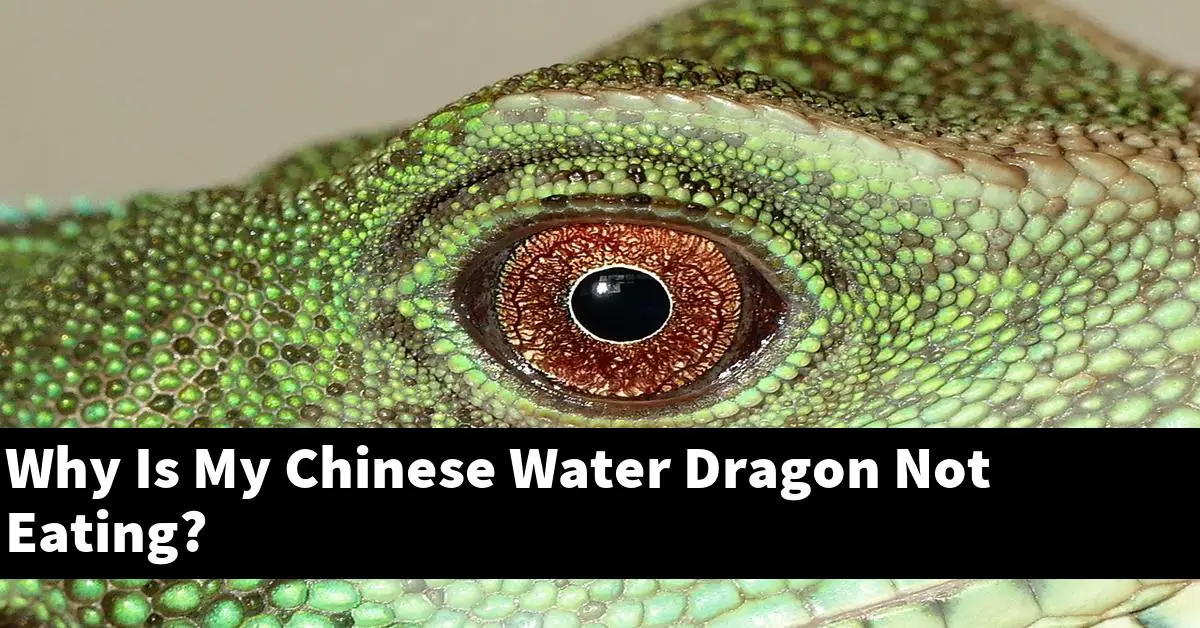If your Chinese water dragon isn’t eating, there could be a number of reasons why. In this blog post, we’ll explore some of the possible reasons and what you can do to help get your water dragon back to eating again.
Table of Contents
Why is my Chinese water dragon not eating?
There could be a few reasons your Chinese water dragon is not eating. One reason could be that it is not feeling well. If your dragon is not acting like its usual self, it may be sick. Another reason could be that it is not comfortable with its surroundings.
If you have recently moved your dragon to a new enclosure, it may be stressed and not eating. Lastly, it could be that your dragon is not getting enough food. If you are not feeding your dragon enough food, it will not have the energy to eat.
What can I do to get my Chinese water dragon to eat?
There are a few things you can do to get your Chinese water dragon to eat.
- First, make sure that you are offering them a variety of fresh, nutritious foods. Water dragons are omnivorous, so offer them a mix of vegetables, fruits, and meat.
- Second, try to feed them live food, as this will encourage them to hunt and eat.
- Third, make sure that you are offering the food at the right time of day – water dragons are most active in the morning and evening, so offer food at these times.
- Finally, if all else fails, you can try offering food that is high in protein, as this will help to boost their metabolism.
Chinese water dragon eating habits
Chinese water dragons are omnivorous reptiles that require both plant and animal matter in their diet. In the wild, they consume a variety of insects, small mammals, and reptiles. They will also eat fruits, vegetables, and flowers. In captivity, they can be fed a diet of commercially available reptile food, supplemented with live food items.
Water dragons are generally easy to feed and will accept most food items that are offered to them. It is important to provide a variety of food items to ensure that they are getting all the nutrients they need. Feeding them live food items is also a good way to encourage them to exercise and stay active.
Water dragons are generally not picky eaters, but there are a few things to keep in mind when feeding them. First, they should only be fed food items that are small enough for them to swallow easily. Second, their diet should be supplemented with calcium and vitamin D3 to ensure that they are getting all the nutrients they need.
How often do Chinese water dragons eat?
Chinese water dragons are semi-aquatic lizards that are native to China, Vietnam, and Laos. In the wild, they can be found near rivers, swamps, and lakes. In captivity, they are popular pets due to their docile nature and impressive size.
Chinese water dragons are opportunistic feeders and will eat anything they can catch. In the wild, their diet consists of insects, small mammals, and reptiles. In captivity, they are usually fed a diet of crickets, mealworms, and pinky mice.
Chinese water dragons should be fed daily. Juveniles should be offered 5-10 crickets or mealworms per day. Adults should be offered 10-20 crickets or mealworms per day. Pinky mice should only be offered to adults and should make up no more than 10% of their diet.
Why is my Chinese water dragon lethargic?
A Chinese water dragon that is lethargic might be suffering from a few different things. It could be that the dragon is not getting enough food or water, that the temperature in its habitat is too low, or that it is sick.
If you are concerned that your Chinese water dragon is lethargic, it is best to take it to a vet for a check-up.
How often do Water dragons sleep?
Water dragons are diurnal, meaning they are most active during the day. However, they will occasionally take a short nap during the day. At night, they will sleep for several hours.
Do Chinese water dragons go into Brumation?
Chinese water dragons are reptiles, and like many reptiles, they undergo a process called brumation. During brumation, reptiles slow down their metabolism and activity level, and they may spend extended periods of time in a state of semi-hibernation.
Chinese water dragons typically begin brumation in the autumn months and may continue until spring.
Summary
If your Chinese water dragon is not eating, there are a few possible explanations. It could be that they are sick, stressed, or simply not hungry. If you think your dragon might be sick, take them to the vet to get checked out.
If they are stressed, try to create a more relaxing environment for them. Finally, make sure you are offering them food that they like and that is nutritious.

